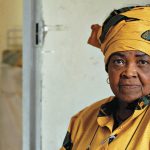Text Messages | Telling stories for young minds
The father of African fiction, Chinua Achebe, wanted writers in Africa to take up the challenge of producing stories for children from the continent’s treasury of tales.
Author:
10 January 2019

Chinua Achebe, it is said, valued one remark over and above all the literary awards and honorary doctorates that he received. “There was a writer named Chinua Achebe in whose company the prison walls fell down,” wrote Nelson Mandela.
It’s an accolade and a speculation with which Lyn Innes ended her obituary of Achebe, published in The Guardian on 22 March 2013, the day after he died at the age of 82. Innes, professor of postcolonial literatures at the University of Kent, worked with Achebe on two anthologies of African literature for publisher Heinemann. The late Nadine Gordimer, one of Africa’s six Nobel Prize in Literature winners, used the same quote in her contribution to the book Chinua Achebe: Tributes and Reflections, edited by Nana Ayebia Clarke and James Currey (Ayebia, 2014), although she gave Mandela’s words as “the prison wall fell”.
Those African Nobel laureates are Albert Camus (Algeria, 1957), Wole Soyinka (Nigeria, 1986), Naguib Mahfouz (Egypt, 1988), Gordimer (South Africa, 1991), JM Coetzee (then South Africa, 2003) and Doris Lessing (Zimbabwe, 2007). Achebe’s name is not among them; it should be.
Related article:
More than anything, it is likely that Achebe’s speech about Joseph Conrad, given in Massachusetts in 1975, forever set the Nobel Academy against the African novelist. Achebe had dared to question the orthodoxy around Conrad. He labelled Conrad a “thoroughgoing racist” and then went on to commit a greater heresy — at least in the eyes and ears of much of his audience that day — by questioning the status of Conrad’s Heart of Darkness as a work of imperishable greatness.
The nub of Achebe’s assertion lay in what he saw as Conrad’s utter dehumanising of Africans, stripping them not merely of agency but, more significantly, of language. Among what Achebe said that day (and continues to, because the essay has been frequently republished and is often taught in conjunction with the work that it critiques):
Africa as setting and backdrop which eliminates the African as human factor. Africa as a metaphysical battlefield devoid of all recognisable humanity, into which the wandering European enters at his peril. Can nobody see the preposterous and perverse arrogance in thus reducing Africa to the role of props for the break-up of one petty European mind?
Achebe’s was not a petty mind. Despite his revulsion at Heart of Darkness, Achebe noted in the same lecture: “I do not doubt Conrad’s great talents.” And, years later, in a revealing profile in The Guardian by Maya Jaggi, Achebe said, “I don’t believe in banning books, but they should be read carefully. Far from wanting the novel (Heart of Darkness) banned, I teach it.” Jaggi’s piece also revealed that while Achebe described VS Naipaul, later to be another Nobel winner, as “a new Conrad … and purveyor of the old comforting myths of race”, he nonetheless recommended the same enlightened, careful reading approach. It might be wise for the many in student and staff bodies of universities to heed those words, for it behooves one to know your enemy.

But it is not as “the father of African fiction”, the author of Things Fall Apart, the chronicler of postcolonial Africa (Anthills of the Savannah) or the literary genius of Arrow of God that I want to remember Achebe. Rather, it is as the author of children’s literature who gave a speech on that subject in Harare, Zimbabwe, in August 1987. I quote from the 16 handwritten, yellowing pages of Achebe’s speech, copies of the original:
There is a strong feeling in some quarters that art and politics mix no more easily than water mixes with oil. That is a view which I do not find any support for in the vast corpus of African traditional stories.
The real problem then is not whether politics is admissible in principle, but how well the artist succeeds in integrating it into his story.
I should end at this point. But let me make a plea to every serious writer in Africa to make a commitment to African children of at least two stories. And I appeal also to our artists to take up seriously the problem of illustrations which are generally poor and unimaginative.
I once asked a leading Nigerian artist and art teacher, Professor Uche Okeke, why our art schools were not providing book illustrators. He replied that students these days are impatient with the discipline of learning to draw a tree to look like a tree; everybody wants to become an abstract painter!
Which sounded rather like what we see with many aspiring writers who flock to poetry for the freedom they think it offers from bothersome grammar and construction.”

